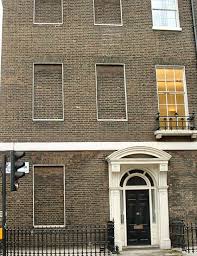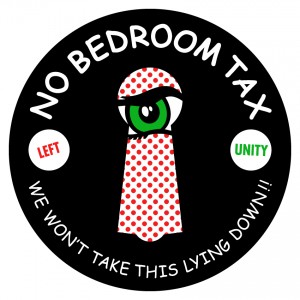From beards to bedrooms: a brief history of mad and bad taxes
Keith Flett looks the history of taxes and puts the new ‘bedroom tax’ into historical context.
The Coalition’s bedroom tax that will leave those in social housing facing a significant reduction in benefit income if they have the temerity, for whatever reason, to have an empty bedroom is one of the most vicious examples of Government imposed taxes in the UK that have no logical basis to them except to disadvantage a section of the population.
In the age of the internet anyone can Google historical examples of such apparently illogical taxes, but making sense of what they meant, why they were introduced and then repealed requires the eye of an historian.
Looking at the historical pattern we find that the Government’s desire to levy extra taxes is mostly related to either the need to raise money during a period of economic crisis or to fund a war. The bedroom tax may well fulfill both criteria.
Some of these taxes have been stranger than others but a central feature of them is that, with a handful of exceptions, they hit the less well off and impact little on the rich.
The first example of a tax deemed unfair by some, the Decimation Tax introduced by Cromwell in 1655, may not in fact seem that unfair to many. It aimed to take ten per cent of the property of supporters of the former King Charles I who had been executed in 1649 to fund a new system of civil order. Following a series of challenges to his rule, most though not all from Royalists, Cromwell divided the country into twelve regions with a Major General in charge of each. The money raised from the tax on Royalists was used to fund militias that would suppress ‘unlawful assemblies’ and pursue thieves and highwaymen. The Major Generals were also charged with enforcing laws against swearing in public and closing ‘unruly’ pubs. It can be seen that the Decimation Tax was unpopular with a far wider layer than just Royalists. MPs refused to make it permanent in 1656 and it was abandoned in 1657. When Royal rule was restored in 1660 it was, however, far from an end to unfair taxes.
The Hearth Tax was introduced in 1662 – the new Government was short of funds. Each fireplace was taxed at two shillings. It was abolished after the 1688 Glorious Revolution.  However the Window Tax soon followed in 1696. Evidence of the impact of this tax can still be seen around the UK with Georgian houses having some windows blocked up to avoid tax. It had to be abolished in 1851 – the same year the all glass Crystal Palace opened – because it was impeding the growth of glass manufacturing, an essential element of the development of a market economy.
However the Window Tax soon followed in 1696. Evidence of the impact of this tax can still be seen around the UK with Georgian houses having some windows blocked up to avoid tax. It had to be abolished in 1851 – the same year the all glass Crystal Palace opened – because it was impeding the growth of glass manufacturing, an essential element of the development of a market economy.
The eighteenth century was keen on taxes that hit elements of property – mainly of the better off. There was a tax on painted, patterned or printed wallpaper at one shilling a square yard from 1712 to 1836. A little later came the Brick Tax [1784-1850] that levied four shillings tax on every one thousand bricks. Again neither tax survived the rise the market economy in the UK.
Two more taxes from that period that also had to go were the Hat Tax [1784-1811] and the Candle Tax [1709-1831]. There were taxes that impacted on the wider population. A soap tax levied at one penny a pound of soap was introduced in 1711 and repealed in 1853. The Stamp Act of 1765 brought in a tax on playing cards and dice. It was not repealed until August 4th 1960.
With the rise of industrial society and the development of a working class the Government looked to widen its tax base. Most of the taxes mentioned so far were regressive in the sense that they had the same impact on rich and poor, except that the latter had less money to afford them. Income Tax, introduced by Pitt in 1799 to fund the Napoleonic Wars, clearly hit the better off harder. It was abolished in 1816 but reintroduced by Peel in 1842 to deal with a budget deficit.
Over time – in effect from the Chartist Manifesto of 1851 – the labour movement has backed the principle that state taxation should fund public services for the benefit of all. It may be argued that the way income tax is applied is unfair but the principle is broadly accepted. The success rate of unfair taxes aimed at the less well off and on a broad basis remains less happy as the imposition and swift abolition of the poll tax after mass protests in the early 1990s reminds us.
The bedroom tax here falls into the ‘double whammy’ category. It is both a silly and illogical tax – although perhaps not quite as bad as the beard tax introduced by Henry V111 in 1535 – and it also hits a wider layer of society.
The historical record indicates that protest followed by abolition will be its fate
thanks to Andrew Burgin for the original idea
2 comments
2 responses to “From beards to bedrooms: a brief history of mad and bad taxes”
Left Unity is active in movements and campaigns across the left, working to create an alternative to the main political parties.
About Left Unity
Read our manifesto
Left Unity is a member of the European Left Party. 
Read the European Left Manifesto
ACTIVIST CALENDAR
Events and protests from around the movement, and local Left Unity meetings.

Saturday 10th January: No to Trump’s war on Venezuela
Protest outside Downing Street from 1 to 3pm.
More events »
GET UPDATES
Sign up to the Left Unity email newsletter.
CAMPAIGNING MATERIALS
Get the latest Left Unity resources.





Many of these taxes are paid now, indirectly as VAT.
BROKEN BRITAIN UNDER TORIES – Discretionary Payments
Smug Smith must think we all are all as thick as he is .Discretionary Payments are nothing new and have been in place for years .What he isn’t telling you is that Central Government give Councils a Quota so when that Quota has run out there is no more – leaving thousands without that ‘safety net’ and there is a time limit on how long you are able to receive them it is a temporary arrangement http://www.brokenbritainundertories.com